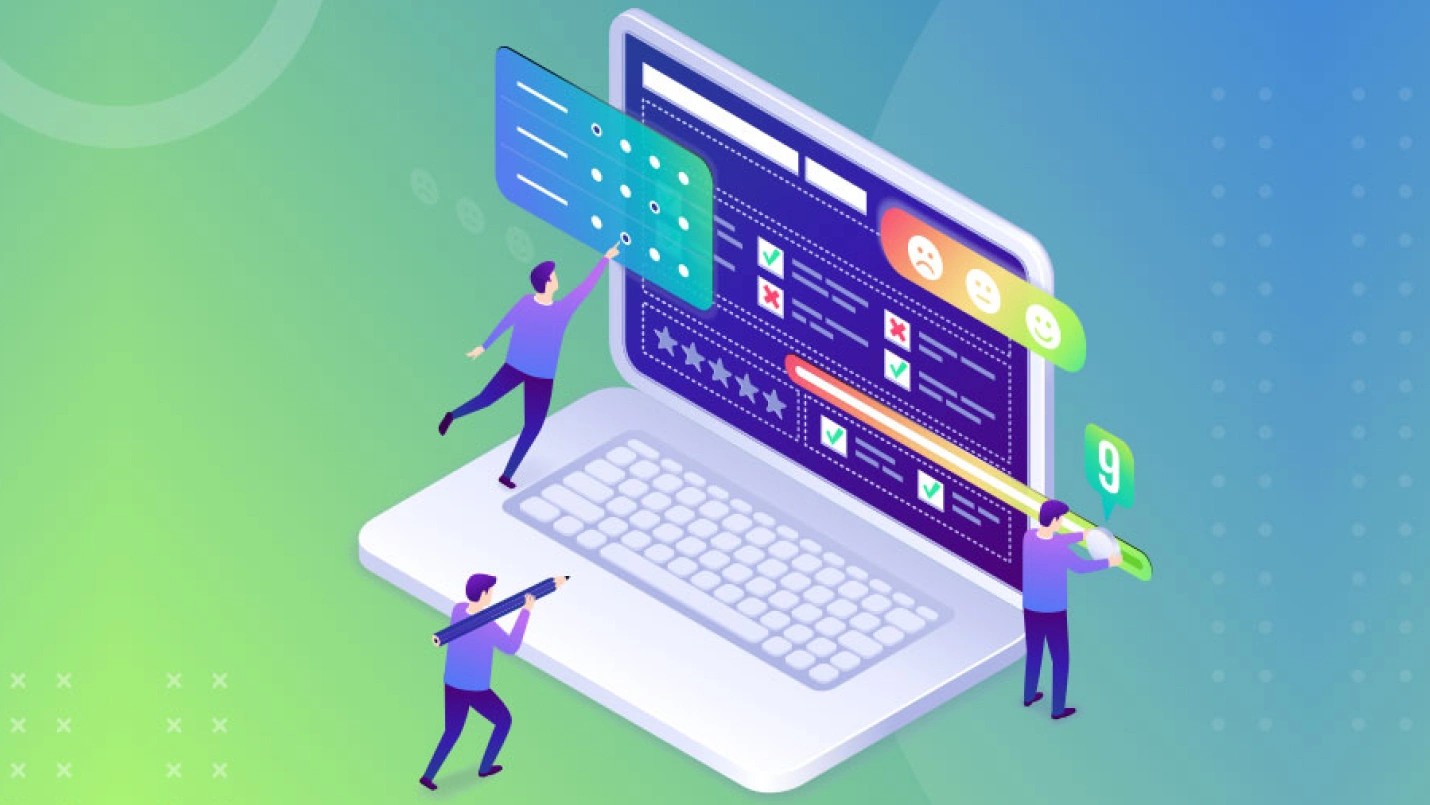What keeps customers coming back month after month, year after year? The stark truth is that no matter how great your product or service is unless you deliver a positive, seamless Customer Experience (CX) and digital experience solutions, you’ll lose business to competitors who do.
Just ask yourself: Would you keep doing business with a company that takes forever to respond to your support requests? How about one that never responds at all? Or what if you had a dedicated sales rep who couldn’t keep track of your past conversations, failing to grasp your business needs?
Chances are, you’d start shopping for a new provider. CX and digital experience platforms pitfalls are common, especially in growing companies where it’s hard to keep track of customer needs, marketing efforts, support requests, and more. These CX and digital experience requirements demand a high-tech solution: Customer Relationship Management (CRM) software.
This blog post will explore how CRM software works and highlight the best CRM software available today to deliver the best CX and digital experience solutions.
What is a CRM?
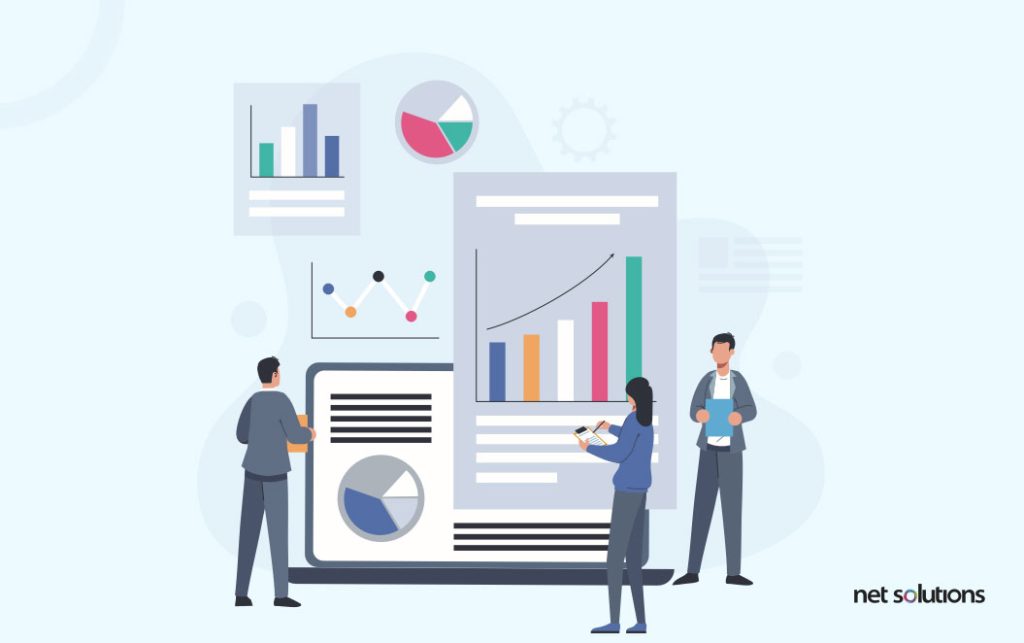
Customer Relationship Management is a system that helps companies understand and improve their customer journeys, and CRM software makes this easy, efficient, and scalable.
When people talk about “using a CRM,” they’re usually not referring to the philosophy of Customer Relationship Management itself. Instead, they’re talking about CRM software platforms like HubSpot and Salesforce, which make optimizing the Customer Experience possible.
An efficient CRM development company will always try and provide CRM software that empowers businesses to track leads, understand their customers through a suite of data analytics, manage communications and marketing campaigns, and a whole lot more. Ultimately, CRM software serves as a one-stop shop for customer and account information, aligning every department and each team member in the same mission—to deliver a superior Customer Experience.
Why Customer Experience Matters

It goes without saying that you’ll lose customers if you don’t treat them well, but did you know that creating a positive Customer Experience can allow you to raise the price on the products or services you sell?
86% of customers said they’re willing to pay more for a great experience, according to a survey by PricewaterhouseCoopers. PwC also found that the more expensive the product, the more people are willing to pay for a seamless CX.
On top of that, a great CX can lead to:
- Increased loyalty (and reduced churn for subscription-based services)
- Greater referral business
- Fewer complaints, which minimizes Customer Support costs
- Higher company morale and increased employee retention, since people like working for companies with satisfied customers
Of course, that just scratches the surface. Here are some of the many ways a CRM can help your business thrive.
Advantages of using CRM software in Your Businesses
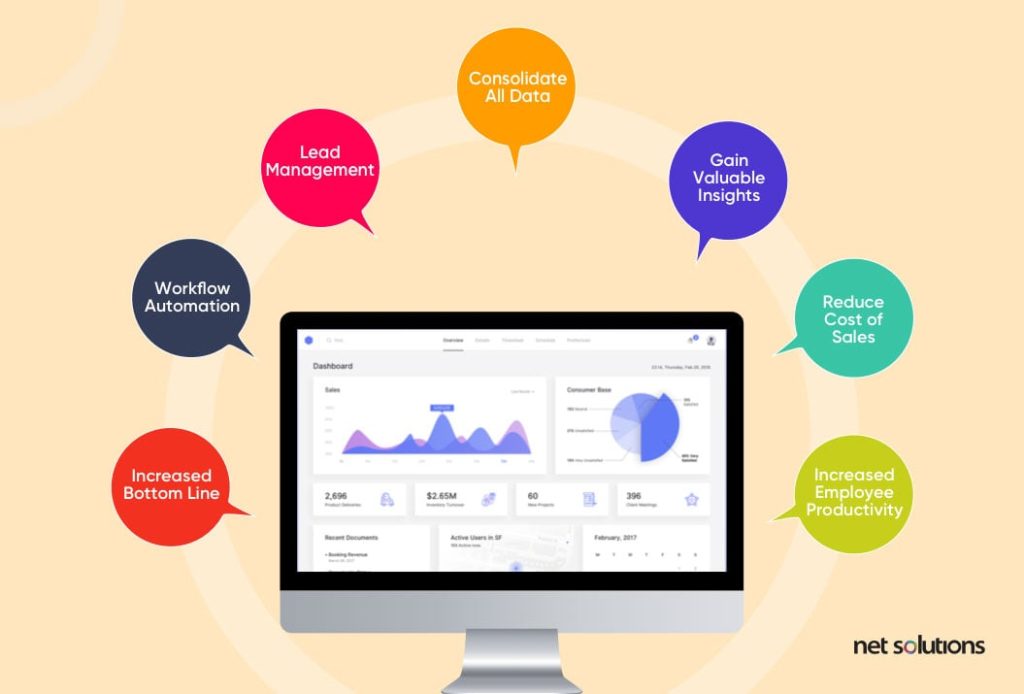
Increased Bottom Line
As we mentioned above, customers are willing to pay more for a better experience. Consider the ROI that comes from boosting your sales while delivering the exact same goods or services.
Your costs typically don’t increase when you improve your CX with the help of a good CRM—in fact, the best CRM software will usually reduce your costs (see below).
What’s left when you cut costs and raise prices based on increased demand? Pure profit.
Workflow Automation
One of our contractors here at Net Solutions told us a story about the time he tried to purchase a set of expensive headphones from a leading online vendor. When the package arrived, it was missing part of the order (he ordered two extra charging cables).
What followed was a CX nightmare that resulted in 10 customer support emails, two new orders placed and shipped to the wrong address, and several hours wasted chasing down a refund—all for a set of parts that cost $5 each.
Whether you’re selling physical products with short sales cycles or multi-million-dollar contracts with 18-month sales cycles, it’s absolutely vital that your workflows serve your customers.
With a proper CRM, everyone in an organization can track individual customer journeys, and CX managers can map out ideal, theoretical customer journeys. Customer Support can see what went wrong with fulfilment, managers can review escalated claims, Marketing can tailor email campaigns based on where a prospect is in the sale cycle. In fact, that just scratches the surface.
Using a good CRM to optimize workflows not only creates a better experience, but it saves money since your employees aren’t spinning their wheels to solve problems that were 100% avoidable from the start.
Lead Management
Leads are the lifeblood of any business, and companies with longer sales cycles need intelligent systems in place to manage those leads.
What happens, for example, when a fresh new prospect sends your sales team an inquiry that gets no response? Think that prospect is likely to convert?
Or what if a recently onboarded “free trial” customer can’t get their questions answered? This is more common than you might imagine. A recent survey by SuperOffice found that more than 62% of customer service emails go unanswered!
Proper lead management is essential in today’s competitive landscape, and the best CRMs make it easy and painless.
Consolidate All Data
Knowledge is power, but only if you can access it when you need it. A CRM software platform is a place where everyone in the company can access the same data regarding:
- Account information
- Customers or individual contacts within an account
- Contact information
- Sales interactions with each customer
- Email campaigns and other marketing efforts
- Purchase history
- Customer Support interactions
- Renewal schedules
- Survey responses
- Contracts
- Literally anything else you want to track
With a good CRM, nobody is ever in the dark.
Gain Valuable Insights
Here’s where the magic happens. When you use a single platform to track all your customer interactions and data, you can analyze that data to learn things about your customers and their buying habits.
For example, do prospects who receive a given email campaign convert faster? Do they spend more? You can track these things, A/B test different campaigns, and optimize what works.
You can also see patterns among different demographics. For instance, your midwest clients might be more receptive to your marketing and make larger purchases than your west coast clients. This might lead you to direct more of your efforts toward targeting that market, assuming the ROI proved greater in the end.
The best CRM software makes it easy to track the data so you can’t act on it.
Reduce Cost of Sales
Market research from IDC tells us that inefficient business processes can cost companies 20-30% of their revenues each year. After all, inefficiency leads to:
- Customer Support escalations
- Unnecessary rework
- Time spent tracking down information
- Expenses associated with repairing a negative experience
- Countless additional hiccups that eat away at prophets
Simply put, a good CRM will likely save you money, no matter how much it costs to onboard and manage.
Increased Employee Productivity
Streamlined processes, easy-to-access data, and better lead management all lead to greater productivity. In other words, if you make it easier for your employees to do their jobs, they will produce more.
This has the obvious benefit of increasing your capacity to serve your customers, but that’s not all it does. When you make it easier for employees to do their jobs, they’re less likely to jump ship and work for someone else out of sheer frustration.
Considering that it costs more than $4,000, on average, to hire and train a new employee in the U.S., it’s easy to see how employee retention can impact your bottom line. Combine greater employee retention with the increased productivity that comes from streamlined processes, and you’ve got a formula for success.
How CRM Software Can Improve Your Customer Experience (CX)
What does it really mean to be customer-centric? A customer-centric business is one that pays careful attention to the customer journey, making it easy for their prospects to discover them, learn about the benefits they offer, work through any roadblocks, and place an order.
The best CRM software will help you:
- Keep in touch with customers via email campaigns and live outreach
- Proactively manage customer relationships
- Personalize communication
- Deliver relevant content that improves their experience and keeps them coming back
- Respond quickly to requests
- Provide a consistent CX across the board
Optimize Customer Experience with the Top 7 CRM Software Platforms on the Market
Now it’s time for the great reveal. The following are our choices for the top 7 CRM software platforms for 2025. Each of these platforms offers something different, and the best CRM platform for your business will depend on a number of factors. Nevertheless, you’re sure to find CRM software on this list that fits your needs.
1. HubSpot CRM
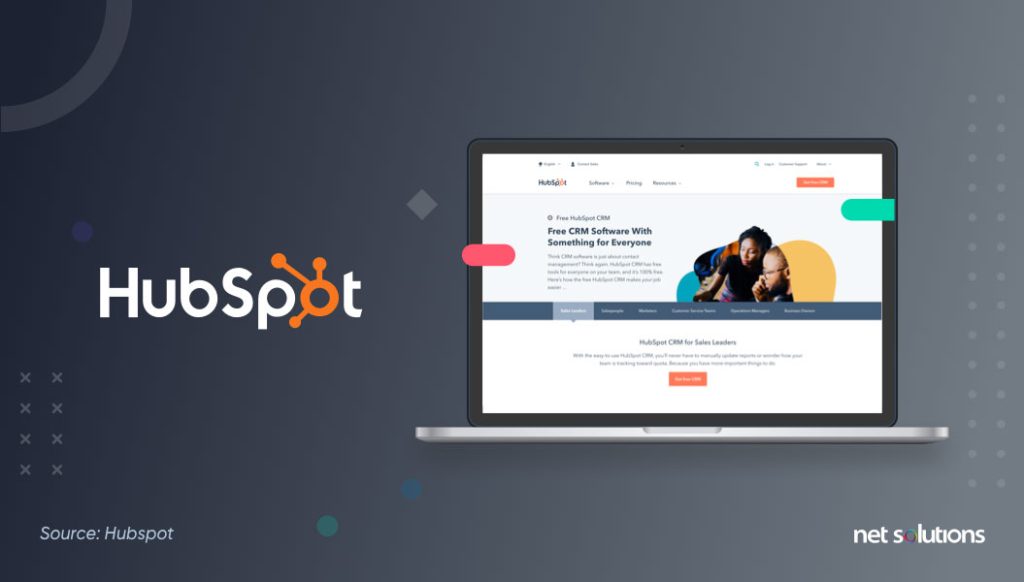
HubSpot CRM is one of the most usable, innovative CRM software platforms available today.
HubSpot became popular before it entered the CRM business, offering powerful marketing automation tools that help companies do things like manage email and social media campaigns, create landing pages, and attract inbound leads. Today, HubSpot CRM customers can use these features (and more), which are all perfectly integrated with the CRM platform.
HubSpot is like a CRM Swiss Army knife, providing a suite of tools that go beyond the fundamentals you’d expect. Where the analogy breaks down is that, unlike Swiss Army knives—which include a mediocre set of tools like tweezers, corkscrews, and nail files—all the extras that come with HubSpot CRM are some of the best you’ll find anywhere.
HubSpot CRM customers get access to:
- HubSpot Marketing Hub to manage email marketing and do things like create landing pages, explore traffic and conversion analytics, and more
- HubSpot Sales Hub to manage every step of the sales process, track emails, schedule meetings, share documents, and everything else you’d expect from a top-notch CRM
- HubSpot Service Hub to manage customer support teams, manage support tickets, interface with customers through live chat, provide thorough reporting, and more
- HubSpot Operations Hub to manage ops via data sync, programmable automation, workflow extensions, and a whole lot more
What makes HubSpot CRM a top CRM software platform?
- Outstanding marketing automation for emails, social media management, analytics, etc.
- Powerful free version to get you started and make sure it’s a good fit
- Exception User Experience (UX) that helps you achieve company-wide adoption
2. Salesforce CRM
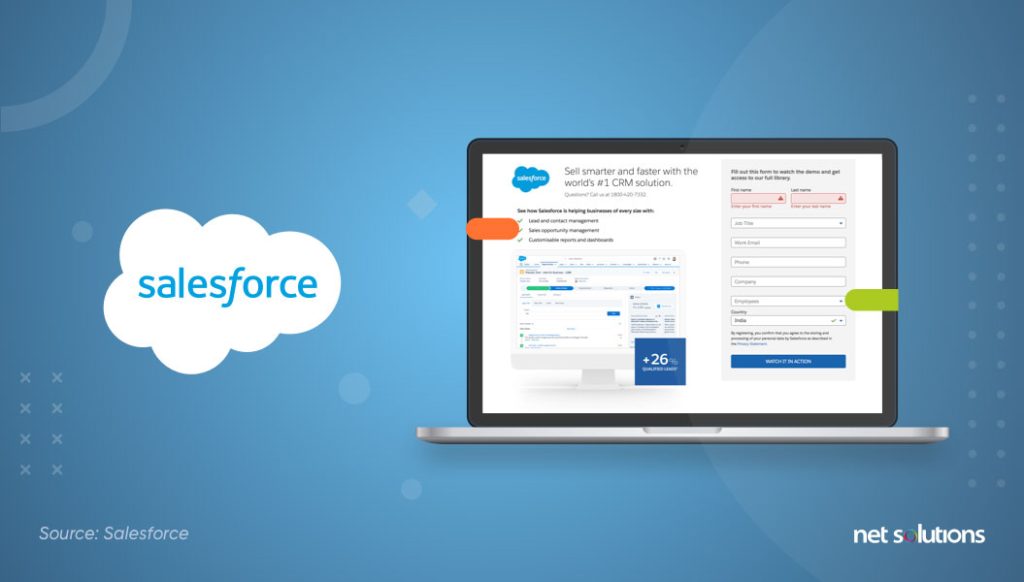
One of the most well-known CRM software platforms in the world, Salesforce provides everything you’d expect: Lead management, customer support features, marketing automation and analytics, and other key features. It also provides documentation and contract management.
What makes Salesforce a top CRM software platform?
- Constant innovation results in cutting edge features
- Smartphone and mobile apps are well-designed and easy to use
- Vast customization options, with plenty of Salesforce consultants who can help you configure your Salesforce CRM to your specifications
3. Zoho CRM
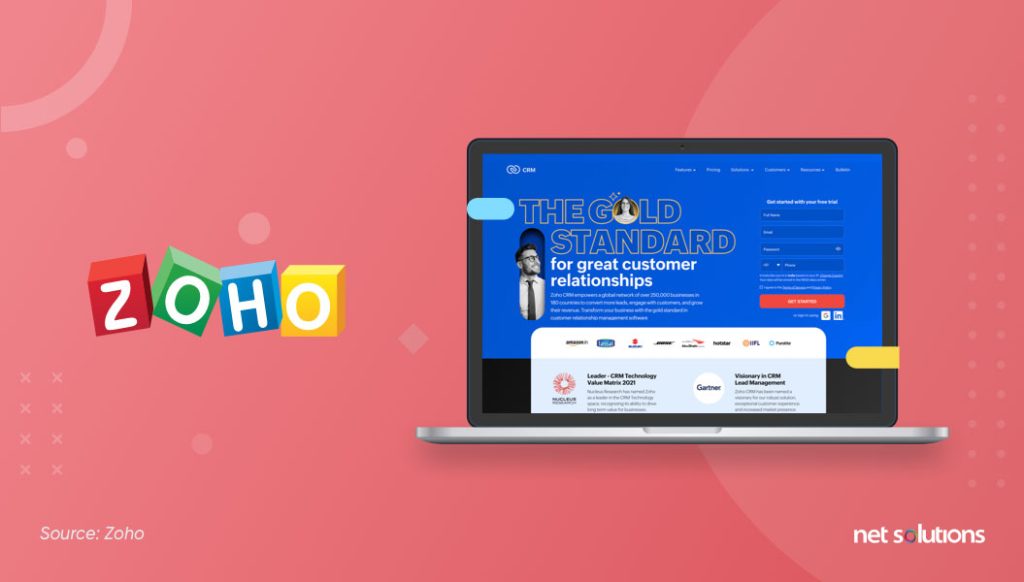
Zoho offers a massive suite of products to help companies manage their business, from Zoho Expense (to manage expense accounts) to Zoho Invoice (for customer billing). Among those offerings is Zoho CRM, which is the company’s flagship product.
Launched in 2005 as Zoho’s initial venture, the CRM provides a wide range of features you’d expect from a top CRM (lead management, analytics, marketing automation), and a few that truly stand out in the field.
What makes Zoho a top CRM software platform?
- Performance management feature that provides sales forecasting and territory management
- Gamification that makes the platform fun to use, which encourages adoption
- One License subscription option offers company-wide access to Zoho’s entire list of product offerings at a reasonable price
4. Dynamics 365
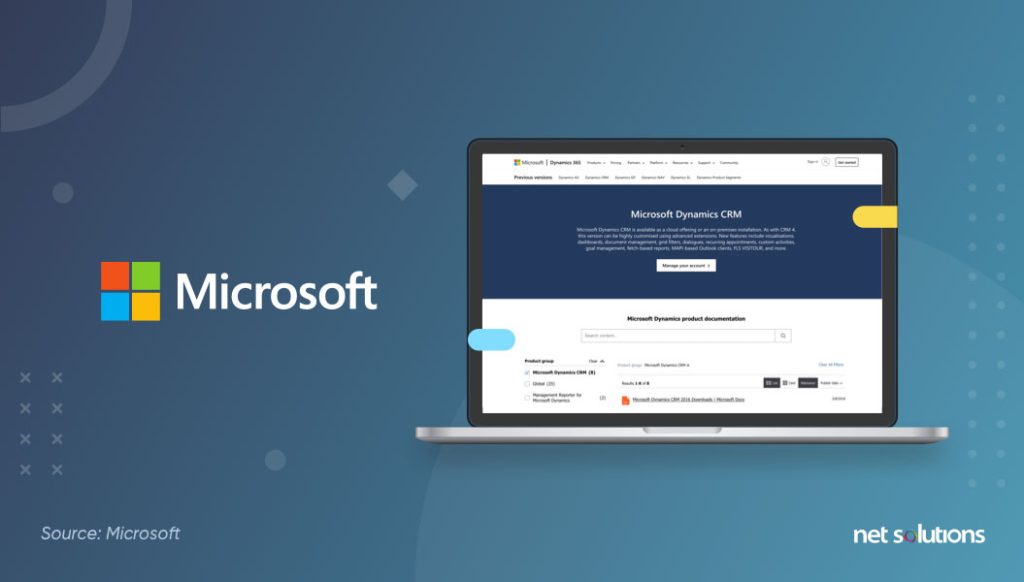
Dynamics 365 is a Microsoft product, so you can rest assured it’s not going to disappear anytime soon. While not the cheapest option for CRM software, it integrates well with other Microsoft products like Word, Excel, and Outlook. This can come in handy, especially for companies that already use Microsoft SharePoint.
What makes Dynamics 365 a top CRM software platform?
- Offline access for those who may need to enter information when they don’t have internet access
- Marketing automation tools that integrate with Microsoft products
- Ability to display multiple dashboards to better analyze customer data
5. Freshworks
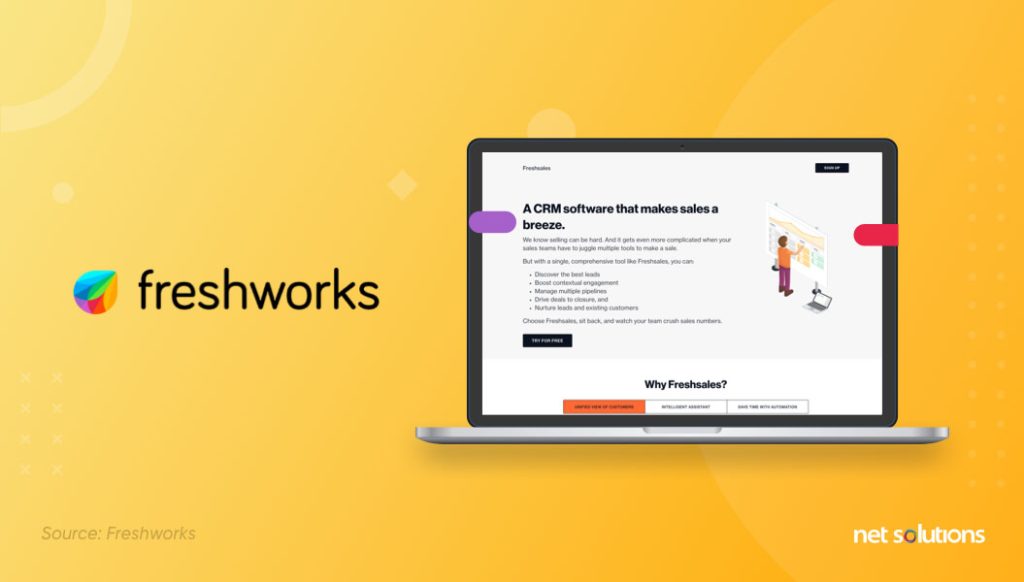
Freshworks offers two CRM software platforms—Freshsales CRM and Freshsales Suite. Freshsales CRM is designed for companies that want to specifically manage their outbound sales process. Freshsales Suite integrates both the marketing and sales components of Customer Relationship Management to include marketing automation, analytics, and other valuable features.
What makes Freshworks a top CRM software platform?
- Freshsales CRM is simple and straightforward, which makes it one of the best software platforms for small businesses that don’t need all the bells and whistles
- Available in over 30 languages so it’s great for international businesses
- Freshworks also provides Freshdesk, an additional set of products focused on Customer Success (CS). Freshworks products can integrate with Freshsales Suite to enhance your CX efforts
6. Pipedrive CRM
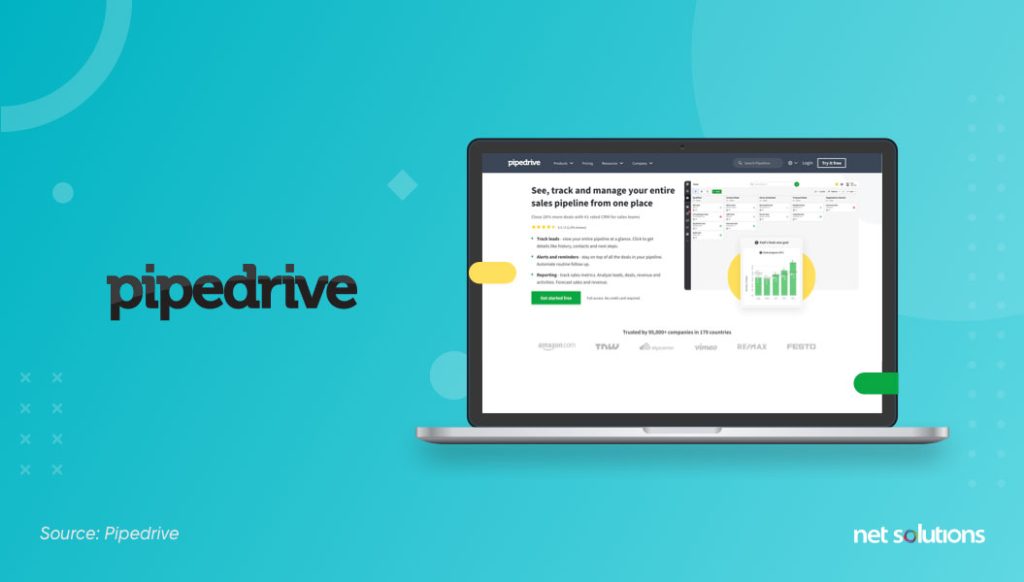
Pipedrive is a great CRM for small to midsize businesses, with a clear focus on lead management and turning prospects into customers. Its website claims that sales professionals close 28% more deals, on average, the first year they start using the software.
Although Pipedrive doesn’t have nearly as many features as CRMs like HubSpot, its easy-to-use interface lets sales teams visualize the entire sales process from beginning to end. It also comes at an affordable price.
What makes Pipedrive CRM a top CRM software platform?
- Simple to use for easy adoption
- Compelling visuals to model the sales process
- Reasonable price tag for companies on a budget
7. Sugar CRM
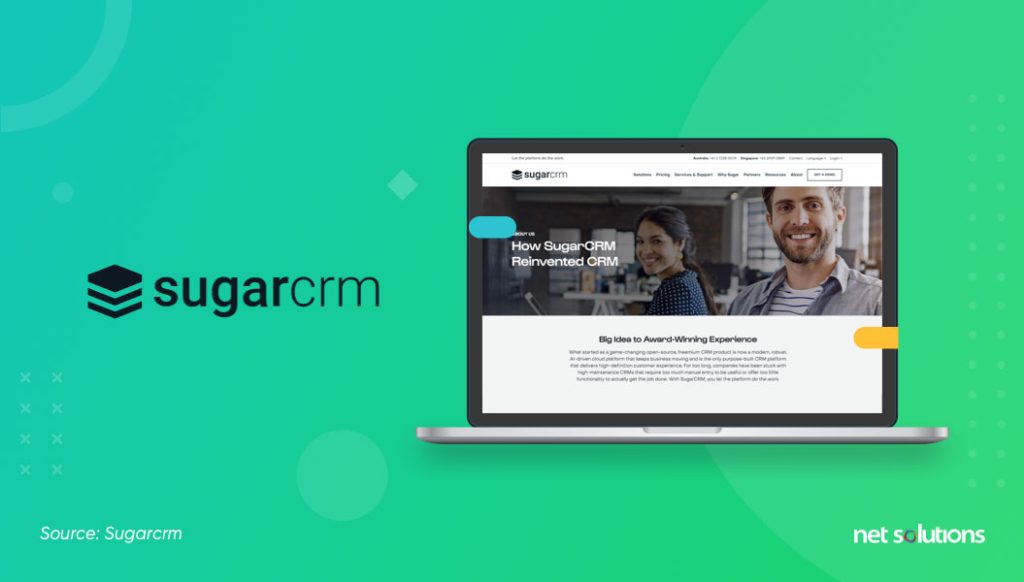
Sugar CRM is a highly customizable solution with different pricing plans for a range of companies, from small businesses with a laser focus on outbound sales to enterprises requiring the full package. Sugar CRM includes marketing automation tools, customer support features, and onsite implementation.
What makes Sugar CRM a top CRM software platform?
- Powerful customizability and a team of consultants who can come to your business and help with your rollout
- Wide range of integrations for greater flexibility
- Packages for everyone from startups to industry giants
What is the Best CRM for Your Business?
The best CRM software for your business will depend on a variety of factors. A few questions to ask yourself include the following:
- Are you focused exclusively on outbound sales for the time being, or do you need inbound marketing tools?
- What is your budget?
- Do your employees require simplicity, or are they highly tech savvy?
- Will you make use of a robust platform’s powerful marketing automation features?
- Do you need Customer Support features?
- Do you require extensive customization, or will an out-of-the-box solution work just fine?
Weigh all of these factors before narrowing down your options, and delve into each one to make sure you and your colleagues like the interface. And of course, make sure it does everything you need it to do.
One final thing to consider is where you expect your company to be in the coming years. If you’re growing rapidly (or hoping to do so), it might make sense to choose a powerful CRM like HubSpot, even if you’re not quite ready to use its vast array of features. After all, you’re likely to need those features in the future. When the time comes to start using them, your employees will already be familiar with the software, so you won’t spend extra time and money on training and customization.
Can you imagine hitting 1,000 employees and being forced to retrain your entire staff on a new CRM, just because you chose a simpler one a year or two earlier? In the end, that might cost you more than you saved by going with a cheaper option.
Whichever CRM software you choose, be sure to make an informed decision that considers current needs, future growth potential, and every element of the Customer Experience you want to address. In the end, this will give you the best chance of building a successful, customer-centric company that stands the test of time.

